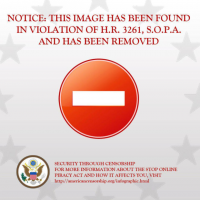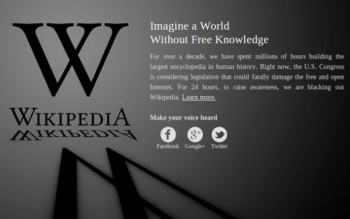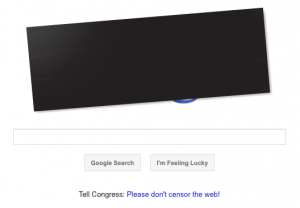Stop Online Piracy Act
H.R.3261 - Stop Online Piracy Act
Contents
Overview of the Act
The Stop Online Piracy Act seeks to block websites that enable or facilitate copyright infringement. With SOPA, rights-holders can demand that payment vendors and ad networks end relationships with infringing websites [2]. The U.S. Government may also seek a court order requiring ISPs and search engines to block consumer access [2]. On December 16th, 2011, the House Judiciary Committee delayed the vote for the implementation of the Stop Online Privacy Act aimed at mandating internet service providers to alter records in the Domain Name System (DNS) so users cannot access a site to restrict copyright material and for the prevention of the sale of counterfeit goods. [3]
If accused, it can block search engines from linking to unauthorized sites and requiring Internet service providers to close off access to such sites. Additionally, it makes it a felony offense to post a copyrighted song or video. This directly affects popular websites such as YouTube, Facebook, Wikipedia, Twitter, blogs etc. whose main objective is to encourage user-generated data. Simply having a site feature that has the capability for a user to commit infringement is enough to brand it as an infringing site. [4]
Supporters of the Act
Supporters of the act primarily include various companies that deal with copyright, including the Motion Picture Association of America, the Recording Industry Association of America, Macmillian Publishers, and Viacom.
The bill had 12 original sponsors: [5]
- Howard Berman (D-CA)
- Marsha Blackburn (R-TN)
- Mary Bono Mack (R-CA)
- Steve Chabot (R-OH)
- John Conyers (D-MI)
- Ted Deutch (D-FL)
- Elton Gallegly (R-CA)
- Bob Goodlatte (R-VA)
- Timothy Griffin (R-AR)
- Dennis A. Ross (R-FL)
- Adam Schiff (D-CA)
- Lee Terry (R-NE)
Opposition
Companies that have publicly opposed the bill include Facebook, Aol, Google, LinkedIn, eBay, and human rights groups including Reporters without Borders and Electric Frontier Foundation.[6] Critics say the problem with DMCA is that has no authority against overseas sites and SOPA aims to bridge that gap. If overseas sites refuse to take down copyrighted work, at least the U.S. can control its companies from providing their services to those sites. SOPA can also make it harder for U.S. Internet users to find and access the sites. It puts site operators responsible for what their users upload.[7]
Justification for Opposition
Many companies that operate online have released statements detailing the specific implications that SOPA will have as well as the effects that SOPA would have had on the founding of their company had it been in effect. The founders of the online forum Reddit have stated that not only would the website, which sees over 30 million unique visitors per month [8], never have been founded, but that under SOPA it could be taken down if one user posted a sinlge link to any illegal download[8]. Another reason why there are advocates opposing the SOPA is that many of its blacklisting policies and traffic restrictions are similar to the on-going internet censorship initiatives in place by the People's Republic of China. American citizens fear an attitude shift towards the censorship policies enacted in the People's Republic of China, and online government protesting limitations implemented will be like Internet Censorship in Hong Kong.
From a non-corporate, legal perspective, both the ACLU[9] and Harvard Law[10] have released statements detailing their view that SOPA violates first amendment rights.
DNS Blocking
The SOPA bill would work by blocking DNS requests. A DNS request works by translating a URL into a numeric ip address, and the bill would allow the government to redirect the URL to a different page, likely a page displaying a message from the government [1]. While the aim of DNS blocking is to block access to sites, there are ways to easily bypass DNS blocking. If the numeric ip address can be obtained, access to the site is still available, though it would be illegal. There also exist plug-ins for bypassing DNS blocking, such as the MAFIAAFire add-on for the Mozilla Firefox browser. Using a proxy server or a VPN are also ways to bypass the DNS block [11].
Businesses Affected
SOPA not only targets websites overseas but also websites originating in the United States. The term used to define sites that SOPA's targets is a foreign infringing site. The word foreign is misleading and does not refer to businesses just overseas[12].
(a) DEFINITION.—For purposes of this section, a foreign Internet site or portion thereof is a ‘‘foreign infringing site’’ if— (1) the Internet site or portion thereof is a U.S.-directed site and is used by users in the United States;
(23) U.S.-DIRECTED SITE.—The term ‘‘U.S.-directed site’’ means an Internet site or portion thereof that is used to conduct business directed to residents of the United States, or that otherwise demonstrates the existence of minimum contacts sufficient for the exercise of personal jurisdiction over the owner or operator of the Internet site consistent with the Constitution of the United States, based on relevant evidence that may include whether- (A) the Internet site is used to provide goods or services to users located in the United States;
As seen by these two statements taken from the SOPA bill, any site that targets the United States is under consideration. There is no mention of the business origin requiring to be outside of the US in the rest of the definition to both terms. The negligence of business origin means, therefore, that domestic and foreign online business are susceptible to SOPA.
Ethical Problems
The Bill would raise ethical problems regarding website businesses, internet services, and social media. Those who oppose the bill foresee problems such as the difficulty of enforcing the bill and the consequences for those who are blocked as a result of illegal activity. Businesses affected would include any site that has a market for people in the United States.
Hindrance to Online Business
If a vendor is seen selling counterfeit items, such as bags or movies, the site can be shut down with no notification, losing their ad networks, revenue, and payment processors as well as their reputation [2]. Businesses would need to spend valuable resources in order to research each item to make sure it is not counterfeit or pirated.
Ethical problem from Hindrances
The problem of product research would make the bill unethical. Researching products would make small online businesses difficult to start up, essentially cutting out the "small guy". Researching products would make major online businesses and auction sites, like Amazon.com and Ebay.com, incredibly difficult to use (as a seller) and restrict the number of products available due to a more stressful product acceptance procedure.
Easier Digital Espionage and Defamation
SOPA would make digital espionage against online businesses much easier in the United States. If a site has any kind of illegal goods being sold, the site gets banned in the United States. All an agent needs to do is clear with the site owner some sort of illegal product and then report the item. The site would go down. If the product is found to be an attempt of defamation, the damage to the online business would have already been done since the site would need to be down while the case is being reviewed by the court system. The court system may take months to years before the case is seen thus taking down the website.
Public Reactions (Blackout and Protests)
Talks of SOPA and PIPA immediately led to strong reactions from individuals and large organizations. On Wednesday Jan. 18th, thousands of sites went dark to protest SOPA & PIPA, stating that the bills threaten the state of prosperity, online security, and freedom of expression. An estimated 13 million people participated in the online protest and an estimated 50,000 websites went dark during the day [13]. Popular websites like Wikipedia, Reddit, Google, and Twitter joined the online protest by blacking out part of their content and posted notices urging visitors to stand against the bill. Most noticeable was the Wikipedia black out. The website temporary withheld all content and articles in protest, leaving open only an explainer and the corresponding Wikipedia articles on the two acts. Google blacked out the logo on its homepage and linked to a website that allows users to sign a petition against the two acts. The blackout was the largest and most extensive online protest in history.
Continued Efforts (Post SOPA)
While the protests were successful in stopping the progress of SOPA in the current state, efforts by proponents will still be taken to amend and push the bill through Congress. On January 20, 2012, House Judiciary Committee Chairman Lamar Smith postponed plans to draft the bill: "The committee remains committed to finding a solution to the problem of online piracy that protects American intellectual property and innovation ... The House Judiciary Committee will postpone consideration of the legislation until there is wider agreement on a solution." Smith is unwilling to cease the legislation and strongly pushes for online piracy laws. He reiterated that the theft of America's intellectual property costs the U.S. economy more than $100 billion annually and results in the loss of thousands of American jobs. Smith concluded by stating, "We welcome input from all organizations and individuals who have an honest difference of opinion about how best to address this widespread problem". [14]
See Also
- Digital Piracy
- Protect IP Act
- Digital Piracy
- File Sharing
- BitTorrent
- Digital Rights Management
- Limewire
References
- ↑ 1.0 1.1 http://www.publicknowledge.org/blog/sopa-immunity-net-neutrality-violations
- ↑ 2.0 2.1 2.2 Huffington Post. "http://www.huffingtonpost.com/2011/11/18/stop-online-privacy-act-small-business_n_1102322.html"
- ↑ Wired. "http://www.wired.com/threatlevel/2011/12/sopa-vote-delayed/"
- ↑ Cnet News. "http://news.cnet.com/8301-31921_3-20062398-281.html"
- ↑ List of US Congresspersons who support or oppose SOPA/PIPA | http://en.wikipedia.org/wiki/List_of_US_Congresspersons_who_support_or_oppose_SOPA/PIPA
- ↑ Letter (PDF) to key members of the U.S. Senate and House of Representatives politechbot.com. Retrieved 2011-12-18.
- ↑ Neverjaded. "http://www.neverjaded.com/2012/01/news-what-is-sopa-end-piracy-not.html"
- ↑ 8.0 8.1 http://www.dailydot.com/politics/reddit-alexis-ohanian-stop-online-piracy-act/
- ↑ ACLU. "http://www.aclu.org/blog/free-speech/urge-congress-stop-sopa"
- ↑ Scribd. "http://www.scribd.com/doc/75153093/Tribe-Legis-Memo-on-SOPA-12-6-11-1"
- ↑ Blogjunkie. "DNS" "http://blogjunkie.net/2011/06/get-around-dns-block-filter"
- ↑ Definition of Foreign infringing site and U.S.-directed site; SOPA BILL http://judiciary.house.gov/hearings/pdf/112%20HR%203261.pdf
- ↑ PCworld. "Protests" http://www.pcworld.com/article/248401/were_sopa_pipa_protests_a_success_the_results_are_in.html
- ↑ House Judiciary. "RogueWebsites" http://judiciary.house.gov/issues/issues_RogueWebsites.html



